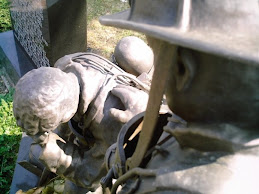By Joseph Kellard
On St. Patrick's Day I won’t be wearing a button that reads “Proud to be Irish.” While I’m of Celtic stock, I’m neither proud nor ashamed to be Irish, but indifferent to this fact, as I would be if I were of any other ethnicity or race. Instead, I’m proud to be an individualist and an American, and believe our nation would be much better off if each of us rediscovered this outlook.
Individuals, of course, can properly enjoy ethnic-oriented celebrations such as St. Patrick's Day, with their particular music, dance, food, drink and (green) outfits. But I won’t proclaim any pride in my ethnicity or race.
That’s because pride is the emotional reward an individual earns after he achieves personally chosen rational values, such as honesty, a productive career, sticking to a healthy diet and earning a doctoral degree. Conversely, a man’s racial makeup is inborn and therefore outside his realm of choice. He can’t take pride in this non-achievement. And while he can be proud that his role models are individuals who did great things, he can’t take any pride for their achievements, especially because he shares their race.
For example, I can’t take pride for being a white man because Thomas Jefferson, Thomas Edison and Henry Ford were great achievers. To do so would be to adopt a false pride. Only through my own choices, actions and achievements can I, like any individual, foster pride.
I’m proud that I’ve overcome some learning obstacles in my youth to achieve certain goals I set, such as becoming a writer. I’m also proud to be an American, but not because I was born here, or because I belong to a nation that produced the great Americans previously mentioned, or because I subscribe to the faith “my country, right or wrong,” a nationalist attitude typical in Europe.
Instead, I’m a proud American because I chose to remain here and live by and fight for the original ideals that built this great nation: a love of the liberty that allows me to pursue my own life, values and happiness. In this land, I’m still free to choose my own creed, career, productive activities and friends, and be a self-made individual, just like the Edisons and Fords of America.
Being Irish is part of who I am, part of my heritage, but it plays no role in my basic identity. I define myself by the values and goals I chose to pursue and achieved, not by unquestioning conformity to the traditions of my ethnic-racial ancestry, nor by its achievers.
Yet America, the land of individualism, even in the aftermath of electing its first black president, remains Balkanized by race. This problem originates when children are taught to identify themselves primarily with their ethnic-racial heritage. Unchecked by individualism — by the idea that each person is autonomous and has the free will and reasoning mind to think for himself — these teachings lead, ultimately, to such abominations as calls for slave reparations, in which the individuals who would receive these handouts were never enslaved, nor have the individuals punished to pay them ever enslaved anyone. In reality, no individual is responsible, guilty or innocent, not as victimizer nor as victim, by virtue of their racial ancestors.
It’s high time for Americans to shed their false racial “pride” — and should stop championing essentially race-based pseudo-ideals such as multiculturalism — to pursue universal values beneficial to all men, no matter their biology or background. Identifying primarily with one’s physical genetics or racial heritage, and the eventual irrational divisions, wars and mass killings this tribalism has ultimately caused throughout history, is nothing to be proud of.
Thursday, March 12, 2009
Subscribe to:
Post Comments (Atom)































+-+June+2009.jpg)











2 comments:
Bravo! Well said!
I was demoted at my work once for standing up against co-workers who were spreading anti-American, pro-"freedom fighter" Middle Eastern rhetoric.
My company relied heavily on multiculturalism to pressure me to "see diverse opinions." I stood my ground, appealed but got nowhere. The human resource department went into action.
I then spoke up (again) directly against a senior manager who was espousing diversity and multiculturalism. The human resource separtment was concerned that there was not enough understanding of diversity.
I stood up in that company meeting and asked him why he was promoting racism? I then gave my short explanation to him and about 300 - 350 listeners. He was livid and cut the meeting off immediately.
I was hauled into the office the next day to explain myself. I thought for certain I was out the door. However, I had prepared all night by writing a seven page essay, fully explaining much the same as you wrote here, why diversity and multiculturalism was wrong.
I went on the attack and offered to sit on the company's "round tables" with its human resource board to plan an elimination of the racist program.
When I was called in, I was told very informally and literally to "shut up!", not to ever join the general meetings, and I'd be watched. To explain myself I read my essay. This way I avoided anger, emotions of fear, and kept to my agenda and points.
I was avoided by my peers, by management and I never felt so alone, no, so alone and right! I was so proud even as I was put on informal probation.
The pressure was incredible. I thought I would be fired for the smallest mistake and maybe I would have been except for a manager of a different department (who greatly liked my work ethic), called me over to work for him in his department.
It took over year for a few managers to come out and say they agreed with me - informally. My victory was, the company to this day has not promoted multiculturalism again in public meetings - at least not where I work. There are about a thousand employees here in Canada.
Its a small victory but my company is huge with over two hundred fifty thousand employees world-wide. I think my essay went quite far in the company.
Ted.
Ted,
Thank you for your reply to my editorial and relaying your story to me. While your example may be a small battle in the wider war against multiculturalism, I would regard it as a huge victory for you that you held to your convictions in the face of, what you believed, what was your likely firing.
~ Joseph Kellard
Post a Comment